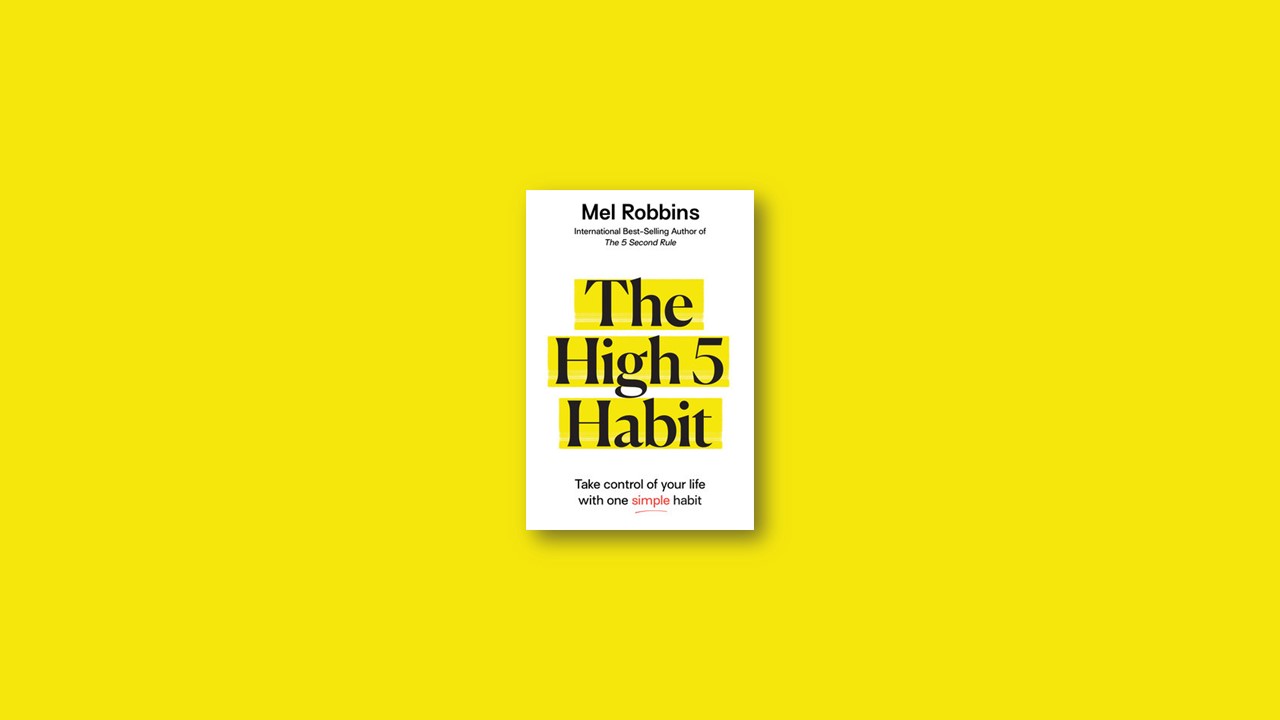Kindle | Hardcover | Audiobook
You deserve a High 5 life.
If you want more celebration, validation, love, acceptance, and optimism, you must practice giving those things to yourself. For real. It starts with YOU. If you don’t cheer for yourself and your dreams, who else will? If you can’t look yourself in the mirror and see someone worth loving, why would anyone else? And speaking of everyone else: when you learn how to love yourself and support yourself, it helps every relationship in your life. When you can celebrate YOURSELF, it helps you cheer louder for others: your friends, your colleagues, your family, your neighbors, and your partner. That’s because your relationship with yourself is the foundation of every relationship you have in life.
Not a year from now. Not when you get that promotion or lose that weight or achieve that goal. You deserve to be cheered for, as you are, where you are, right now, starting today. You not only deserve it—you need it. It satisfies your most fundamental emotional needs: to be seen, heard, and acknowledged. More than that, based on research, you thrive when you receive this kind of support. Feeling encouragement, believed in, and celebrated are the most inspiring forces on the planet.
When you make high fiving yourself a daily habit, you will discover the secret to self-love and self-acceptance. This is another weird part about high fiving yourself: you stop seeing the physical you and you see the YOU within. The person and all that your life represents.
You’re not just seeing your physical self in the mirror—you are greeting your presence, like a neighbor waving to you from their front porch. You raise your hand and silently say to yourself, Hey you! I see you! You got this. Let’s do this, every morning. All of this will have a major impact on your mood, your feelings, your motivation, your resilience, and your attitude.
The High 5 Habit is not a gesture. It is self-validation.
It doesn’t matter you are standing in your boxer shorts, a ratty robe, your exercise gear, or your birthday suit. When your hand slaps the mirror, you feel seen, heard, and appreciated.
Plus, as soon as your hand hits that mirror, your mood isn’t the only thing that’s shifted. Your perspective gets a shift too. It makes you think about what bigger game you want to play today. Right now, you stand in front of the mirror and you mindlessly march through your to-do list—which is why you tank mentally. You start focusing on everyone and everything else. When you practice the high five, you think about what you want to do for yourself. How do you want to show up today? Who do you want to be? What is the one personal project that you need to make some progress on for yourself?
This moment of intentional reflection is more powerful than you think. Recent research from Harvard Business School has found that taking a moment to reflect on your work improves job performance, helps you be more effective, and makes you feel more motivated. It impacts everything from your confidence in achieving your goals to making you more productive. All from a simple moment of reflection.
Research backs it up.
The motivational power of a high five has been well documented. In fact, wait until you hear what researchers discovered about high fives when studying the best way to motivate kids in the face of challenging tasks. In one study, school-aged kids were split into three groups and asked to complete difficult tasks. Then, the researchers gave them one of three different forms of encouragement. The kids were either praised for a trait (“You’re so smart.” or “You’re so talented.”), or they were told they were working hard and praised for their effort (“You’re really dedicated!”), or they were simply given a high five.
The high five was hands down the best motivator. Here’s why: The kids who were told they were smart, talented, or skilled were the least motivated and had the least fun. Those praised for their effort showed greater enjoyment and exhibited a higher level of persistence. But kids who got a simple high five? They felt the most positive about themselves and their efforts, and they kept going for the longest time (persistence, people!), despite making mistakes. In fact, the results were so clear that the researchers titled the study “High Fives Motivate” when they published it in the academic journal Frontiers in Psychology.
High fives, trust, and how to build champions.
A high five also helps you build trust in yourself and your ability to win in life. UC Berkeley researchers studied NBA players’ habits of success. At the beginning of a season, they recorded how often players gave each other high fives and other signs of encouragement, like fist bumps. Using the number of high fives during a game at the beginning of the season, the researchers then predicted which teams would have the best records at the end of the season.
The best NBA teams—those who made it to the championships—were the ones who gave the most high fives at the start of the season. Why are high fives such good predictors of a positive outcome? It comes down to trust. The teams who high fived constantly lifted each other up. The physical touch says, I’ve got your back. Let’s go, we’ve got this. It helps you shake off a bad play. It lifts your mood. It communicates confidence. And reminds you that you can still win.
The high five teams believed in each other and in their ability, as a team, to win. They played like they trusted each other. The unspoken power they shared helped them become unstoppable. Conversely, the worst teams in the NBA barely touched. They had terrible body language. No high fives. Nada. And it showed: they consistently made selfish, inefficient plays, and their records reflected it.
Even if a team has good players, that’s not enough. When you are high fived through every moment of practice, through the whole season, and right to winning a championship. It creates a culture of celebration and encouragement. It makes you selflessly give it your all. That’s the feeling you need, and you can create that partnership with yourself.
Be kind.
When researchers study all the things that you could change in your life that make a meaningful impact on the quality of your life, the single most important change is making it a habit to be kind to yourself.
Researchers at the University of Hertfordshire in the UK did a study on things that create happiness and satisfaction. They looked at a whole range of behaviors and habits that you could do to improve your life, from exercising, to trying new things, to working on your relationships, to being kind to others, to doing things that bring you a sense of meaning, to working on your goals—you name it.
That study concluded that the number one predictor of how happy and satisfied you could be was self-acceptance. Meaning, how kind you were to yourself and how much you cheered for yourself had a direct and proportionate impact on your happiness. Being kind to yourself has the power to completely change your life—yet self-acceptance is what we practice the least. You’ll drink the kale smoothie, go to the gym, get up earlier, cut out gluten, and meditate and the entire time beat yourself up about the fact that you’re still not doing enough or not doing it right . . . That’s why being kind to yourself is what really matters.
So why don’t you do it?
None of us have been taught how. It’s that simple. Our parents were hard on themselves so, in turn, they were hard on us. You may have grown up with a mom who criticized herself in the mirror or who felt guilty for taking time for herself. Or, a father who didn’t express his emotions and measured his self-worth based on what he earned or how he achieved success outside the home. If you’re tough on yourself, blame the “tough love” you received as a child. Suck it up, pull your big girl pants up, wipe away those tears.
The worst parenting excuse in the world is “It was done to me and I’m okay.” That makes zero sense. If you’ve suffered as a kid, you should do everything you can to make sure it doesn’t happen to your kids. But that’s not what happens. Your parents just repeated what was done to them.
That’s why you’re so tough on yourself. As a kid, your brain absorbed everything around you. That explains your unconscious drive to repeat some dynamics you learned as an infant and child.
FAQs
Q: How exactly do I start doing it?
It’s very simple.
Every morning, before you look at your phone or let the world in, take a moment to be with your reflection. The second you leave that bathroom, almost every moment is going to be about other people. You’ll be distracted by your phone, what’s going on at work, or what your kids need. The High 5 Habit is a moment every morning for you. It has two simple, but powerful, steps:
Standing in front of the mirror, just be with yourself for a second.
When you feel ready, high five yourself in the mirror.
Q: Why not high five someone else?
You already high five everybody else.
You’re looking in the wrong mirror when you look for your worth in other people’s approval. A million likes on social media means nothing if you don’t like yourself. Flip the focus from external validation—Likes. Follows. Views. Praise—to giving that validation to yourself, just for being alive and standing here ready to seize the day.
Q: Why does something so simple work?
The genius and power of this habit is precisely because it’s so simple.
It would be easy to think this is the stupidest thing you’ve ever heard. But therein lies the secret: if it’s simple, you’ll do it. Tools only work when you use them. Behavior change only happens when you repeat the behavior. Research shows us that to build a new habit, it needs to be easy to add to your routine. Since it’s easy and it feels really good, by doing it each day, you’ll prove to yourself that you can stick to a challenge, and that’s what builds confidence.
Wait, Wait . . . There’s More!
Next Step: A high five morning.
A high five morning is a series of simple promises. Each promise is backed by research, super easy, feels good, and creates a series of small wins that send you into your day, ready to rock and roll.
It starts when your alarm rings. Below, you’ll see both the action you’re going to take, and the deeper thing it’s teaching you to do.
Here’s how it goes:
- Put yourself first—Get up when the alarm rings.
- Tell yourself what you need to hear—Say, “I’m okay. I’m safe. I’m loved.”
- Give yourself a gift—Make your bed.
- Celebrate yourself—High five the mirror.
- Take care of yourself—Put your exercise clothes on.
- Train your RAS—Dream in the morning.
A high five morning is one where you come first. These promises help you prioritize yourself, your needs, and your goals before your to-do list, your phone, social media, emails from work, turmoil in the news, the needs of your family, and everything else outside your control. When you keep these simple promises to yourself, you come first. Every morning. Every day of your life. Period.



